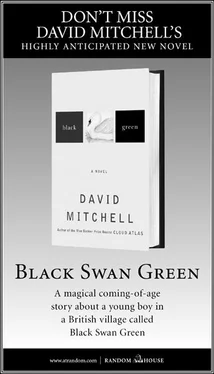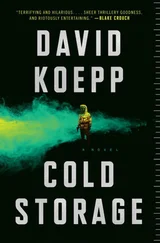David Mitchell - Cloud Atlas
Здесь есть возможность читать онлайн «David Mitchell - Cloud Atlas» весь текст электронной книги совершенно бесплатно (целиком полную версию без сокращений). В некоторых случаях можно слушать аудио, скачать через торрент в формате fb2 и присутствует краткое содержание. Жанр: Старинная литература, на английском языке. Описание произведения, (предисловие) а так же отзывы посетителей доступны на портале библиотеки ЛибКат.
- Название:Cloud Atlas
- Автор:
- Жанр:
- Год:неизвестен
- ISBN:нет данных
- Рейтинг книги:5 / 5. Голосов: 1
-
Избранное:Добавить в избранное
- Отзывы:
-
Ваша оценка:
- 100
- 1
- 2
- 3
- 4
- 5
Cloud Atlas: краткое содержание, описание и аннотация
Предлагаем к чтению аннотацию, описание, краткое содержание или предисловие (зависит от того, что написал сам автор книги «Cloud Atlas»). Если вы не нашли необходимую информацию о книге — напишите в комментариях, мы постараемся отыскать её.
Cloud Atlas — читать онлайн бесплатно полную книгу (весь текст) целиком
Ниже представлен текст книги, разбитый по страницам. Система сохранения места последней прочитанной страницы, позволяет с удобством читать онлайн бесплатно книгу «Cloud Atlas», без необходимости каждый раз заново искать на чём Вы остановились. Поставьте закладку, и сможете в любой момент перейти на страницу, на которой закончили чтение.
Интервал:
Закладка:
Glass & peace alike betray proof of fragility under repeated blows. The first blow to the Moriori was the Union Jack, planted in Skirmish Bay’s sod in the name of King George by Lieutenant Broughton of HMS Chatham just fifty years ago. Three years later, Broughton’s discovery was in Sydney & London chart agents & a scattering of free settlers (whose number included Mr. Evans’s father), wrecked mariners & “convicts at odds with the New South Wales Colonial Office over the terms of their incarceration” were cultivating pumpkins, onions, maize & carrots. These they sold to needy sealers, the second blow to the Moriori’s independence, who disappointed the Natives’ hopes of prosperity by turning the surf pink with seals’ blood. (Mr. D’Arnoq illustrated the profits by this arithmetic—a single pelt fetched 15 shillings in Canton & those pioneer sealers gathered over two thousand pelts per boat!) Within a few years the seals were found only on the outer rocks & the “sealers” too turned to farming potatoes, sheep & pig rearing on such a scale that the Chathams are now dubbed “The Garden of the Pacific.” These parvenu farmers clear the land by bushfires that smolder beneath the peat for many seasons, surfacing in dry spells to sow renewed calamity.
The third blow to the Moriori was the whalers, now calling at Ocean Bay, Waitangi, Owenga & Te Whakaru in sizable numbers for careening, refitting & refreshing. Whalers’ cats & rats bred like the Plagues of Egypt & ate the burrow-nesting birds whose eggs the Moriori so valued for sustenance. Fourth, those motley maladies which cull the darker races whene’er White civilization draws near, sapped the Aboriginal census still further.
All these misfortunes the Moriori might have endured, however, were it not for reports arriving in New Zealand depicting the Chathams as a veritable Canaan of eel-stuffed lagoons, shellfish-carpeted coves & inhabitants who understand neither combat nor weapons. To the ears of the Ngati Tama & Ngati Mutunga, two clans of the Taranaki Te Ati Awa Maori (Maori genealogy is, Mr. D’Arnoq assures us, every twig as intricate as those genealogical trees so revered by the European gentry; indeed, any boy of that unlettered race can recall his grandfather’s grandfather’s name & “rank” in a trice), these rumors promised compensation for the tracts of their ancestral estates lost during the recent “Musket Wars.” Spies were sent to test the Moriori’s mettle by violating tapu & despoiling holy sites. These provocations the Moriori faced as our Lord importuned, by “turning the other cheek,” & the transgressors returned to New Zealand confirming the Moriori’s apparent pusillanimity. The tattooed Maori conquistadores found their single-barked armada in Captain Harewood of the b ri g Rodney , who in the dying months of 1835, agreed to transport nine hundred Maori & seven war canoes in two voyages, in guerno for seed potatoes, firearms, pigs, a great supply of scraped flax & a cannon. (Mr. D’Arnoq encountered Harewood five years ago, penurious in a Bay of Islands tavern. He at first denied being the Rodney’s Harewood, then swore he had been coerced into conveying the Blacks, but was unclear how this coercion had been worked upon him.)
The Rodney embarked from Port Nicholas in November, but its heathen cargo of five hundred men, women & children, packed tight in the hold for the six-day voyage, bilged in ordure & seasickness & lacking the barest sufficiency of water, anchored at Whangatete Inlet in such an enfeebled state that, had they but the will , even the Moriori might have slain their Martial brethren. The Goodly Samaritans chose instead to share the diminished abundance of Rēkohu in preference to destroying their mana by bloodletting & nursed the sick & dying Maori back to health. “Maori had come to Rēkohu before,” Mr. D’Arnoq explained, “yet gone away again, so the Moriori assumed the colonists would likewise leave them in peace.”
The Moriori’s generosity was rewarded when Cpt. Harewood returned from New Zealand with another four hundred Maori. Now the strangers proceeded to lay claim to Chatham by takahi , a Maori ritual transliterated as “Walking the Land to Possess the Land.” Old Rēkohu was thus partitioned & the Moriori informed they were now Maori vassals. In early December, when some dozen Aboriginals protested, they were casually slain with tomahawks. The Maori proved themselves apt pupils of the English in “the dark arts of colonization.”
Chatham Isle encloses a vast eastern salt marsh lagoon, Te Whanga, very nearly an inland sea but fecundated by the ocean at high tide through the lagoon’s “lips” at Te Awapatiki. Fourteen years ago, the Moriori men held on that sacred ground a parliament. Three days it lasted, its object to settle this question: Would the spillage of Maori blood also destroy one’s mana? Younger men argued the creed of Peace did not encompass foreign cannibals of whom their ancestors knew nothing. The Moriori must kill or be killed. Elders urged appeasement, for as long as the Moriori preserved their mana with their land, their gods & ancestors would deliver the race from harm. “Embrace your enemy,” the elders urged, “to prevent him striking you.” (“Embrace your enemy,” Henry quipped, “to feel his dagger tickle your kidneys.”)
The elders won the day, but it mattered little. “When lacking numerical superiority,” Mr. D’Arnoq told us, “the Maori seize an advantage by striking first & hardest, as many hapless British & French can testify from their graves.” The Ngati Tama & Ngati Mutunga had held councils of their own. The Moriori menfolk returned from their parliament to ambushes & a night of infamy beyond nightmare, of butchery, of villages torched, of rapine, of men & women, impaled in rows on beaches, of children hiding in holes, scented & dismembered by hunting dogs. Some chiefs kept an eye to the morrow & slew only enough to instill terrified obedience in the remainder. Other chiefs were not so restrained. On Waitangi Beach fifty Moriori were beheaded, filleted, wrapped in flax leaves, then baked in a giant earth oven with yams & sweet potatoes. Not half those Moriori who had seen Old Rēkohu’s last sunset were alive to see the Maori sun rise. (“Less than an hundred pureblooded Moriori now remain,” mourned Mr. D’Arnoq. “On paper the British Crown freed these from the yoke of slavery years ago, but the Maori do not care for paper. We are one week’s sail from the Governor’s House & Her Majesty maintains no garrison on Chatham.”)
I asked, why had not the Whites stayed the hands of the Maori during the massacre?
Mr. Evans was no longer sleeping & not half so deaf as I had fancied. “Have you ever seen Maori warriors in a blood frenzy, Mr. Ewing?”
I said I had not.
“But you have seen sharks in a blood frenzy, have you not?”
I replied that I had.
“Near enough. Imagine a bleeding calf is thrashing in shark-infested shallows. What to do—stay out of the water or try to stay the jaws of the sharks? Such was our choice. Oh, we helped the few that came to our door—our shepherd Barnabas was one—but if we stepped out in that night we’d not be seen again. Remember, we Whites numbered below fifty in Chatham at that time. Nine hundred Maoris, altogether. Maoris bide by Pakeha , Mr. Ewing, but they despise us. Never forget it.”
What moral to draw? Peace, though beloved of our Lord, is a cardinal virtue only if your neighbors share your conscience.
Night
—
The name of Mr. D’Arnoq is not well-loved in the Musket . “A White Black, a mixed-blood mongrel of a man,” Walker told me. “Nobody knows what he is.” Suggs, a one-armed shepherd who lives under the bar, swore our acquaintance is a Bonapartist general hiding here under assumed colors. Another swore he was a Polack.
Читать дальшеИнтервал:
Закладка:
Похожие книги на «Cloud Atlas»
Представляем Вашему вниманию похожие книги на «Cloud Atlas» списком для выбора. Мы отобрали схожую по названию и смыслу литературу в надежде предоставить читателям больше вариантов отыскать новые, интересные, ещё непрочитанные произведения.
Обсуждение, отзывы о книге «Cloud Atlas» и просто собственные мнения читателей. Оставьте ваши комментарии, напишите, что Вы думаете о произведении, его смысле или главных героях. Укажите что конкретно понравилось, а что нет, и почему Вы так считаете.












